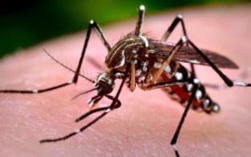COCA Clinical Reminder: May 20, 2016
May 20, 2016
With the recent Zika virus outbreaks in the Americas, the number of Zika virus disease cases among travelers visiting or returning to the United States is increasing. This Clinical Reminder serves to inform clinicians about CDC Zika Guidance and Recommendations. If you have questions about this reminder or have other clinical questions, please email us at coca@cdc.gov.
Transmission of Zika Virus
 Although mosquito bites are the main way that Zika virus is transmitted, Zika virus can also spread when an infected man has sex (vaginal, anal and oral) with his female or male partners. We know that the Zika virus can stay in semen longer than in blood, but we do not know exactly how long the virus can stay in the semen. In the known cases of sexual transmission, the men had symptoms. We don’t know if men infected with Zika who never develop symptoms can have the virus in their semen or spread Zika through sex. We also do not know if women can spread Zika virus to their sex partners.
Although mosquito bites are the main way that Zika virus is transmitted, Zika virus can also spread when an infected man has sex (vaginal, anal and oral) with his female or male partners. We know that the Zika virus can stay in semen longer than in blood, but we do not know exactly how long the virus can stay in the semen. In the known cases of sexual transmission, the men had symptoms. We don’t know if men infected with Zika who never develop symptoms can have the virus in their semen or spread Zika through sex. We also do not know if women can spread Zika virus to their sex partners.
Zika virus can be passed from a pregnant woman to her fetus during pregnancy or at delivery. To date, there are no reports of infants getting Zika through breastfeeding. Because of the benefits of breastfeeding, mothers are encouraged to breastfeed even in areas where Zika virus is found.
There have not been any Zika virus confirmed blood transfusion transmission cases in the United States. There have been suspected cases of Zika transmission through blood transfusion in Brazil, and these reports are currently being investigated. In previous Zika virus outbreaks, including the French Polynesia, the virus has been found in blood donors.
Diagnosing and Treating Zika Virus Disease
Many people infected with Zika won’t have symptoms or will only have mild symptoms. The incubation period for Zika is not known, but is likely to be a few days to a week. The most common symptoms of Zika are fever, rash, joint pain, and conjunctivitis (red eyes). When patients present with these symptoms, healthcare providers should ask them about recent travel.
There is no vaccine to prevent or medicine to treat Zika. Healthcare providers should treat patients’ symptoms by encouraging rest, fluid hydration, and fever management with acetaminophen or paracetamol. Until dengue is ruled out, and to reduce the risk of bleeding, healthcare providers should advise patients not to take aspirin and other non-steroidal anti-inflammatory drugs.
Zika Diagnostic Testing
Tests for Zika Virus
During the first week after onset of symptoms, Zika can often be diagnosed by performing real-time reverse transcription-polymerase chain reaction (rRT-PCR) on serum. Although viral RNA can often be identified in serum the first 7 days after onset of symptoms, viremia decreases over time, and a negative rRT-PCR on serum collected 5-7 days after symptom onset does not preclude Zika. Serologic testing can be used to detect Zika virus-specific IgM and neutralizing antibodies, which typically develop toward the end of the first week of illness. Plaque-reduction neutralization testing (PRNT) can be performed to measure virus-specific neutralizing antibodies to confirm primary flavivirus infections and differentiate from other viral illnesses. Additionally, rRT-PCR be performed on urine collected <14 days after onset of symptoms in patients with suspected Zika virus disease, and should be performed in conjunction with serum testing if using specimens collected <7 days after symptom onset. Testing blood, semen, or urine is not recommended to determine how likely someone is to pass Zika virus through sex.
Groups Who Should Be Tested for Zika Virus
All pregnant women with possible exposure to and symptoms of Zika virus should be tested. Asymptomatic pregnant women who traveled to areas with Zika can be offered testing from 2 to 12 weeks after returning. Testing is recommended within the first week after symptom onset for pregnant women living in areas with ongoing transmission of Zika and who have symptoms consistent with Zika.
A pregnant woman with possible sexual exposure to Zika virus should be tested if either she or her male partner develop symptoms of Zika. CDC also recommends Zika virus testing for people who may have been exposed to Zika through sex and who have Zika symptoms; however, testing blood, urine, or semen is not recommended to determine the risk of sexual transmission of Zika virus. Because Zika virus can remain in semen longer than blood, a man might have a negative blood or urine test but still have Zika virus in their semen.
Zika virus testing is recommended for infants born to women potentially infected with Zika during pregnancy and who were diagnosed with microcephaly at birth, intracranial calcifications detected prenatally or at birth, or other abnormalities consistent with congenital Zika virus infection; or if the mother’s possible Zika exposure occurred within 2 weeks of delivery and the infant develops Zika symptoms within 2 weeks of birth; or when the mother had a positive or inconclusive prenatal or perinatal Zika virus test result.
Healthcare providers should work with their state, local, and territorial health departments for assistance with ordering laboratory tests and interpreting test results.
Zika and Pregnant Women
 Zika virus infection during pregnancy is a cause of microcephaly and other severe fetal brain defects. In addition, other problems have been detected in pregnancies and among fetuses and infants infected with Zika virus before birth, such as miscarriage, stillbirth, absent or poorly developed brain structures, defects of the eye, hearing deficits, and impaired growth.
Zika virus infection during pregnancy is a cause of microcephaly and other severe fetal brain defects. In addition, other problems have been detected in pregnancies and among fetuses and infants infected with Zika virus before birth, such as miscarriage, stillbirth, absent or poorly developed brain structures, defects of the eye, hearing deficits, and impaired growth.
Until more is known, healthcare providers should advise pregnant women not to travel to any areas where Zika virus is spreading. If a woman must travel, healthcare providers should discuss with the pregnant woman the risk and steps to prevent mosquito bites. Pregnant women and their male partners who live in or travel to areas with Zika should take steps to protect their pregnancy by using condoms correctly every time they have vaginal, anal, or oral sex or not have sex during the pregnancy. This recommendation would not change if the man tested negative for Zika.
During pregnancy, microcephaly can sometimes be diagnosed during an ultrasound. Microcephaly might not be detectable until late in the second or early in the third trimester of pregnancy.
US Zika Pregnancy Registry
CDC has established the US Zika Pregnancy Registry to learn more about outcomes associated with Zika infection in pregnancy and congenital Zika infection and is collaborating with state, tribal, local, and territorial health departments to collect information.
CDC maintains a 24/7 Zika consultation service for health officials and healthcare providers caring for pregnant women. To contact the service, call 770-488-7100 or email ZIKAMCH@cdc.gov
Zika and Women of Reproductive Age
Based on the available evidence, Zika virus infection in a woman who is not pregnant would not pose a risk for birth defects in future pregnancies after the virus has cleared from her blood. From what we know about similar infections, once a person has been infected with Zika virus, he or she is likely to be protected from a future Zika infection.
Zika virus usually remains in the blood of an infected person for about a week. There is no evidence that the virus will cause infection in a pregnancy that occurs after the virus is cleared from the mother’s blood.
Couples Trying to Get Pregnant after having Zika
Healthcare providers should advise women diagnosed with Zika who desire pregnancy to wait 8 weeks after symptoms start to attempt conception. They should advise couples in which a man has been diagnosed with Zika to wait at least 6 months after symptoms begin before attempting conception.
Couples Trying to Get Pregnant with Possible Exposure to Zika
For men and women without symptoms of Zika with possible exposure to Zika from recent travel or sexual contact, healthcare providers should recommend waiting at least 8 weeks after their possible exposure before attempting conception.
Zika and Infants and Children
Babies with microcephaly can have a range of other health problems, depending on the severity of their microcephaly. These problems can range from mild to severe, are often lifelong, and in some cases, life-threatening. Because it is difficult to predict at birth what problems babies will have from microcephaly, they often need close follow-up through regular check-ups with a doctor or other healthcare provider to track their growth and development. CDC does not know if a newborn who gets Zika at birth will develop microcephaly after birth.
Zika Resources for Healthcare Providers
April 12, 2016 Clinician Outreach and Communication Activity (COCA ) Call: Updated Interim Zika Clinical Guidance for Reproductive Age Women and Men, Sexual Transmission of Zika, and the U.S. Zika Pregnancy Registry
Possible Zika Virus Infection Among Pregnant Women — United States and Territories, May 2016. Morbidity and Mortality Weekly Report (MMWR). May 20, 2016/65
Interim Guidance for Zika Virus Testing of Urine — United States, 2016. Morbidity and Mortality Weekly Report (MMWR). May 13, 2016/65(18); 474
Update: Interim Guidance for Health Care Providers Caring for Women of Reproductive Age with Possible Zika Virus Exposure — United States, 2016. Morbidity and Mortality Weekly Report (MMWR). April 1, 2016/65(12); 315-322
Update: Interim Guidance for Prevention of Sexual Transmission of Zika Virus — United States, 2016. Morbidity and Mortality Weekly Report (MMWR). April 1, 2016/65(12); 323-325.
Update: Interim Guidelines for Healthcare Providers Caring for Infants and Children with Possible Zika Virus Infection — United States, February 2016. Morbidity and Mortality Weekly Report (MMWR). February 26, 2016/65(7); 182-187
Update: Interim Guidelines for Health Care Providers Caring for Pregnant Women and Women of Reproductive Age with Possible Zika Virus Exposure — United States, 2016. Morbidity and Mortality Weekly Report (MMWR). February 12, 2016/65(5); 122-127.
Zika and Blood Transfusion
Zika Symptoms, Diagnosis, and Treatment
Zika Virus Transmission and Risk
Zika Travelers’ Health: Avoid Bug Bites
Zika Virus and Sexual Transmission
Zika Algorithms and Fact Sheets
Tools for Healthcare Providers
US Zika Pregnancy Registry
Questions and Answers for Healthcare Providers Caring for Pregnant Women and Women of Reproductive Age with Possible Zika Virus Exposure
Questions and Answers for Healthcare Providers Caring for Infants and Children with Possible Zika Virus Infection
Did a colleague forward this to you?
Subscribe here for information about upcoming COCA Calls, Clinical Reminders, Training Resources, and other Public Health Updates.